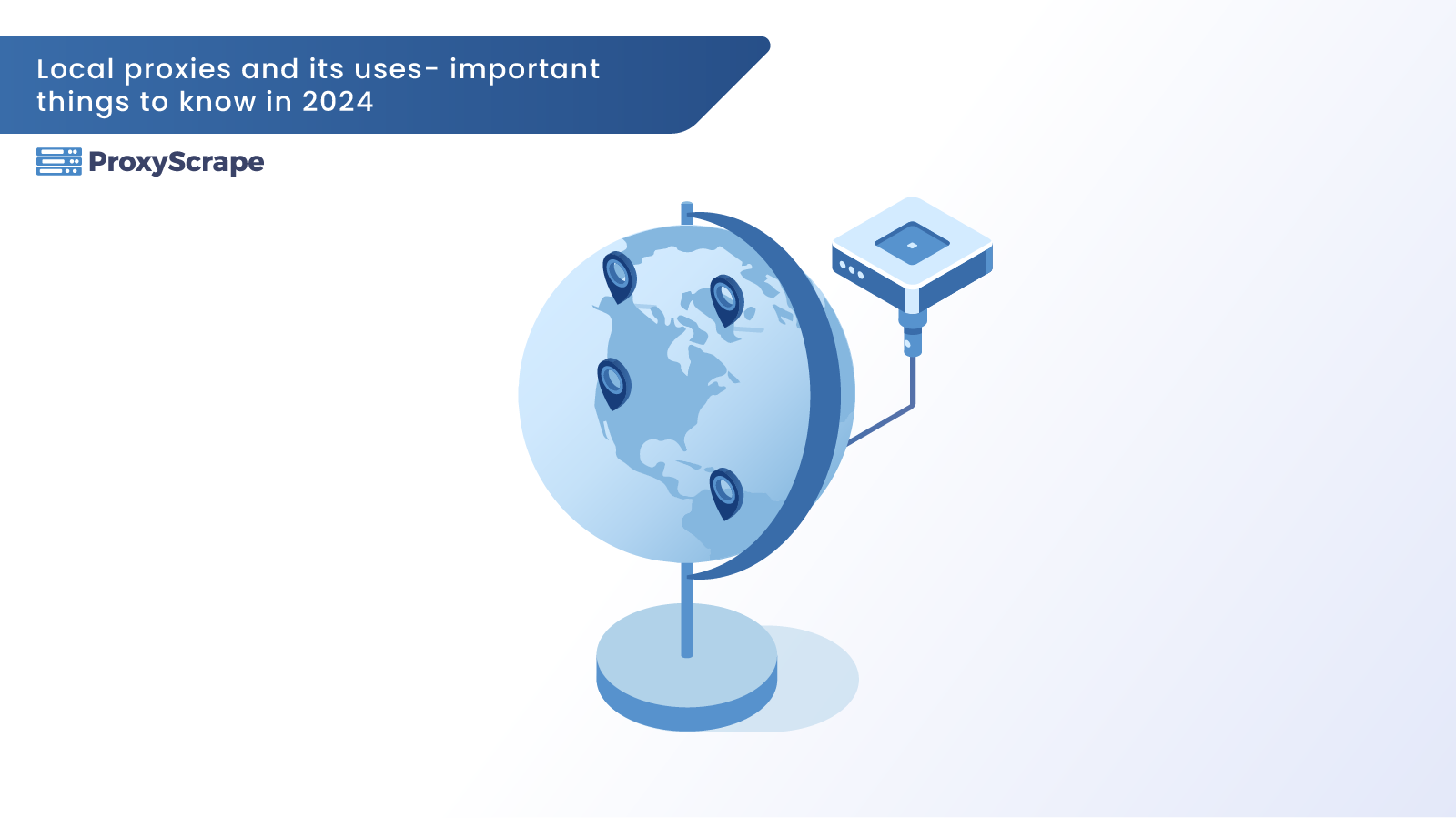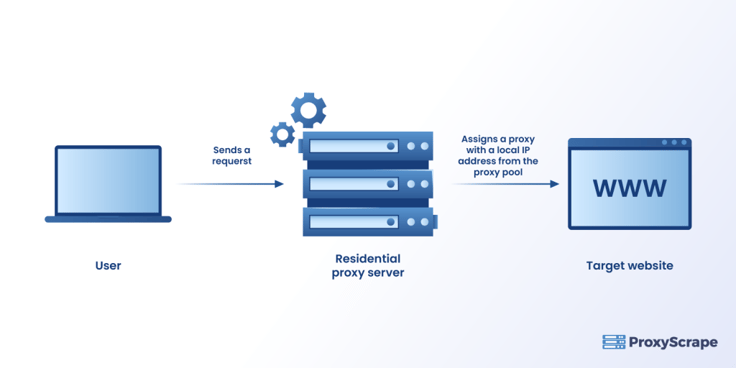Local Proxies and Its Uses- Important Things to Know in 2026

Local Proxies and their Uses As the internet grows, it has become localized, and users face many restrictions in accessing the content on certain websites as there are restrictions based on the geolocation of the IP address. Some websites won’t block users but will only present the web content of the user’s location, and they
Local Proxies and their Uses
As the internet grows, it has become localized, and users face many restrictions in accessing the content on certain websites as there are restrictions based on the geolocation of the IP address.
Some websites won’t block users but will only present the web content of the user’s location, and they may not be able to access the global content. This serves as a restriction for researchers, SEO managers, and business analysts who wish to reach and access global content.
This could be because a government, business, or organization wants restrictions on accessing their websites. These restrictions are a preventive measure to avoid hacking and phishing attacks, and cyber laws in one country might not be compatible with others.
A shopping website might block a user when they access it from another country because they would not have the provisions to ship products to other countries. Also, certain global organizations would block their employees from accessing their resources.
This article looks at how to access restricted resources by using local proxies and how to set up a local proxy server.
Feel free to jump to any sections to learn about local proxies!
To Access Geo-Specific Content
Bypass Geolocation Restriction
To Place Filter On Web Browser
How to Setup a Local Proxy Server?
Residential Proxy Network for Local Proxies
Best Residential Proxies for Your Local Proxies:
What is a Local Proxy?
A local proxy is a standard proxy server that takes an IP address of a real user or a device in a location. The local proxies allow users to access content in a particular country, city, or subnet they wish to access, irrespective of their location.
For example, certain content on the United States’s websites is restricted to users of other countries. Only users in the United States can access this content. The other users miss out on information that might be useful for their business or research.
The users get a location error when they try to access the country’s website that has imposed laws to block other countries’ users. Local proxies try to bypass these restrictions and access geo-specific content.
For instance, a proxy server in the United States provides proxies with IP addresses of that country. The users of other countries are given a proxy with a local IP address that helps them to access location-specific information.
Why Use Local Proxies?
Local proxies have an IP address attached to a specific location. These proxies hide your IP address to scrape and harvest data from around the web.
To Access Geo-Specific Content
You must use local proxies from those locations to access geo-specific local content. For example, if you want to scrape SERP data, you need proxies to access the location from where you need SERP data. Otherwise, the SERP data you get is from your location, not your interest location.
Bypass Geolocation Restriction
You may use local proxies to access the content you have been blocked from accessing because of your location. You can bypass the geolocation restriction with local proxies and access otherwise blocked content.
For instance, if you want to access Netflix in the US, you need a local US IP address. You need a local proxy to pass the block if you access it outside the US.
To Place Filter On Web Browser
Most people use the proxy server to access geo-restricted content and hide their IP address from the target server. But you can do the reverse technique here with a proxy server. With the help of datacenter proxies, you can implement a filter on the currently working browser. This helps restrict user access and prevent them from visiting harmful websites. Organizations, schools, and universities mostly use this technique.
How to Setup a Local Proxy Server?
There are different proxy providers, and the process of setting up and accessing local content varies with the provider and the proxy type. You must know the right local proxies to access the content you want.
If you are using residential proxies, some providers allow you to access IPs from their supported locations. You can get the proxy address and port pair for the specific location you want and set it up in the client application.
If you use a data center proxy, you must choose the location at the point of purchase. Many proxy providers have data centers for proxies worldwide, so you must purchase a proxy in the location you want to access.
Before using proxies, it is advisable to set the proxy on the browser and check the geolocation by accessing IPinfo.io. It is a service to check the status of the proxy and know its location. You should ensure that the location advertised by the proxy provider and the actual location are the same.
Residential Proxy Network for Local Proxies

Local proxies use residential proxies to access localized data from the internet. A residential proxy is an intermediate proxy server that provides the IP addresses that point to the original location of the system. They are not easily detectable as a proxy by a simple IP check and hence cannot be banned on the website the user accesses.
A user requests a connection to the target website through the local proxy server. The local proxy server assigns a proxy through which all the requests to the target website are channelled.
Local proxies depend on residential proxies that provide an alternative IP address. This alternative IP address belongs to a real device on the network. A user’s request is conveyed through the residential proxy, masking the real IP address.
The target website understands your IP address from a local network and not from any other country and does not block it.
Businesses and individual users use residential proxies to avoid restrictions on accessing the content of the desired website. The residential proxy server has a database of the IP addresses of a local network through the Internet Service Providers (ISP). It has two different types, static and rotating residential proxies.
The static residential proxy uses an IP address for a longer time. On the other hand, rotating residential proxies keep changing or rotating their IP addresses. Therefore residential proxies are undetectable as they keep changing their IP address frequently, which makes IP tracking impossible.
Best Residential Proxies for Your Local Proxies:
ProxyScrape is one of the most popular and reliable proxy providers online. Three proxy services include dedicated datacentre proxy servers, residential proxy servers, and premium proxy servers. So, what is the best proxy in order to test a website using proxy? Before answering that questions, it is best to see the features of each proxy server.
A dedicated datacenter proxy is best suited for high-speed online tasks, such as streaming large amounts of data (in terms of size) from various servers for analysis purposes. It is one of the main reasons organizations choose dedicated proxies for transmitting large amounts of data in a short amount of time.
A dedicated datacenter proxy has several features, such as unlimited bandwidth and concurrent connections, dedicated HTTP proxies for easy communication, and IP authentication for more security. With 99.9% uptime, you can rest assured that the dedicated datacenter will always work during any session.
Last but not least, ProxyScrape provides excellent customer service and will help you to resolve your issue within 24-48 business hours.
Next is a residential proxy. Residential is a go-to proxy for every general consumer. The main reason is that the IP address of a residential proxy resembles the IP address provided by ISP. This means getting permission from the target server to access its data will be easier than usual.
The other feature of ProxyScrape’s residential proxy is a rotating feature. A rotating proxy helps you avoid a permanent ban on your account because your residential proxy dynamically changes your IP address, making it difficult for the target server to check whether you are using a proxy.
Apart from that, the other features of a residential proxy are: unlimited bandwidth, along with concurrent connection, dedicated HTTP/s proxies, proxies at any time session because of 7 million plus proxies in the proxy pool, username and password authentication for more security, and last but not least, the ability to change the country server. You can select your desired server by appending the country code to the username authentication.
The last one is the premium proxy. Premium proxies are the same as dedicated datacenter proxies. The functionality remains the same. The main difference is accessibility. In premium proxies, the proxy list (the list that contains proxies) is made available to every user on ProxyScrape’s network. That is why premium proxies cost less than dedicated datacenter proxies.
So, what is the best solution to test a website using proxy? The answer would be “dedicated datacenter proxy.” The reason is simple. As said above, the residential proxy is a rotating proxy, meaning that your IP address would be dynamically changed over a period of time which can be helpful to trick the server by sending a lot of requests within a small time frame without getting an IP block.
Next, the best thing would be to change the proxy server based on the country. You must append the country ISO_CODE at the end of the IP authentication or username and password authentication.
FAQs:
FAQs:
1. What are local proxies?
2. What are the uses of local proxies?
3. How do I find my local proxy address?
Closing Thoughts
The internet has many restrictions on accessing online content, creating isolated bubbles of content and services. Such content would be accessible only within a concealed location, preventing prospective customers from viewing it.
You can use a data center proxy that masks your IP addresses when you connect to the target website. Unlike a residential proxy, it uses proxies from a third-party provider. The proxies are from a cloud provider, and the target website won’t be able to identify the user’s real IP address, enabling the user to access the website anonymously.
Datacenter proxies are best suited for web scraping on a small scale. Residential proxies support mass scraping by continuously rotating the IPs without getting traced and blocked.
You can make use of datacenter proxy, residential proxy, dedicated proxy, and premium proxy provided by ProxyScrape for web scraping.